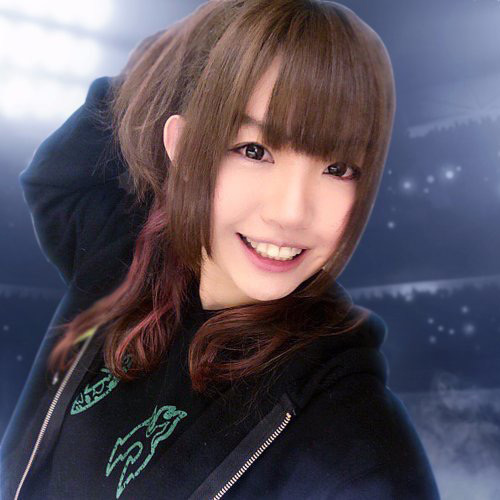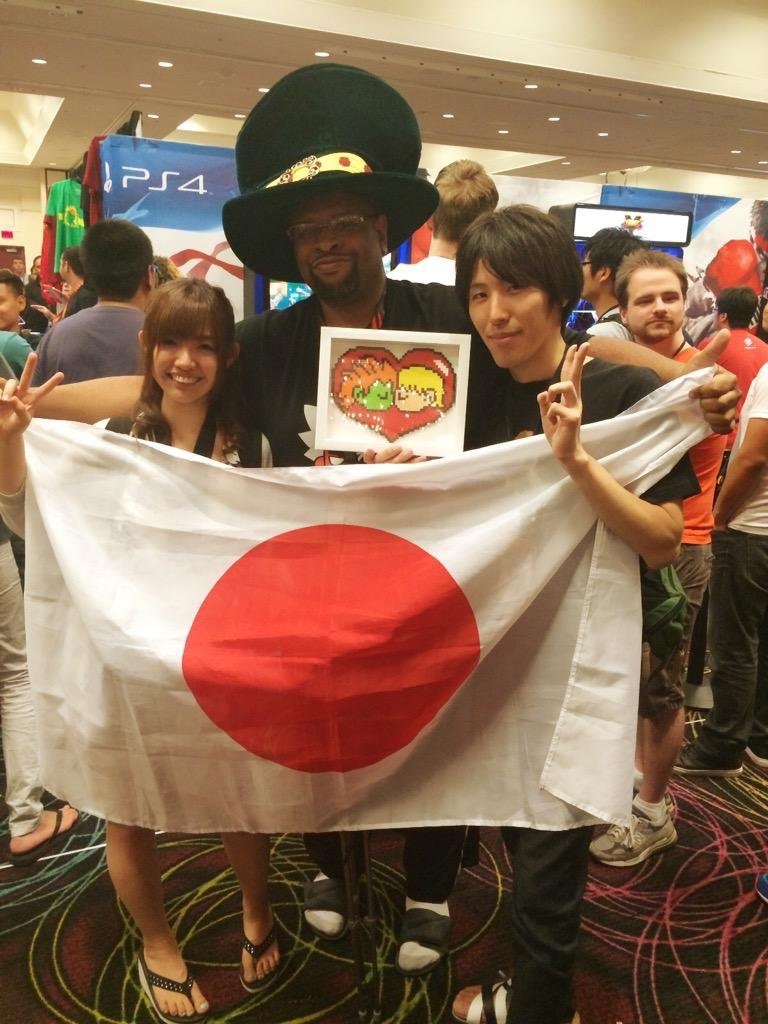eSPORTS eスポーツに関する最新情報をチェック!
Professional Gamer ChocoBlanka "Why we continue to play overseas" (Part 1)

Currently, the population of professional gamers is overwhelmingly male--I am the first Japanese pro female professional existence! My husband is also a professional gamer and a teammate, and as far as I know we are "the world's first active professional gamer couple."
I play for a professional gaming team called EchoFox based in Los Angeles, USA. The owner is Rick Fox, who is a former NBA player who has won three NBA championships. I moved to EchoFox in January 2017. Before that, my husband and I belonged to EvilGeniuses, North America's largest professional gaming team.
Though there are many pro gaming teams also in Japan, my husband and I play for North American team. People ask us, "Why did we choose a North American team? Why go overseas?” I ponder it every day. So in response, I would like to write about the theme of "Why we continue to play overseas," about current situation of Japan and the world's professional gamers, what I ponder and feel every day. l divide my response into two parts.
Here are five reasons why we continue to play overseas--
- 1. The Japanese Market does not have matured “e-sports” market.
- 2. The “e-sports” has low visibility in Japan.
- 3. The larger the "population" of the target audience, the better
- 4. Event Selection as Pro Gamer
- 5. We want to continue promoting professional gaming to a wide audience
In short, the answer would be "because the most logical option for us as professional gamers is to continue to play overseas." But I would like to explain in more detail. I will explain about 1 and 2 above in this article.
1. The Japanese market does not have matured “e-sports” market.
Around this time in 2016, we saw Internet articles saying that "2016 is the first year of e-sports." At the beginning of this year, I also saw an article proclaiming 2017 to be “the first year of e-sports.” This type of article is printed every year, because apparently every year is the first year of e-sports.…I think that this situation displays the difficulties involved in making the Japanese people aware of the existence of “e-sports,” and with the issues concerning attempts to build a system and a foundation for e-sports inside the country.
I believe that one of the main reasons for this difficulty is that e-sports is not considered to be a professional-caliber activity. There are professional teams in Japan who have players under contract (either yearly contracts or on-commission contracts) and who have obtained sponsor support. However, when a game is broadcast over the Internet, few people bother to tune in to watch even high-ranking players who have won championships overseas. I believe this has more to do with people not understanding what e-sports are rather than lack of ability or poor performance on the part of the players.
Only a few gaming-related companies sponsor e-sports in Japan. The current sponsors of each team are gaming peripheral manufacturers and related Japanese e-sports promotional companies. I personally think that this situation needs to change. The professional e-sports environment overseas is sponsored by leading companies outside the gaming industry, such as food and beverage manufacturers. I think that this is proof that they understand e-sports and recognize that they are worth sponsoring. In contrast, the current sponsorship situation in Japan shows a lack of understanding of both e-sports and the professional players.
Unless an agency or company invests their time and resources to find sponsors for e-sports teams and events, we as individuals will have to take on that task. And by doing so, we would have to create something from nothing in order to build the infrastructure needed for the e-sports industry. There would be many challenges to overcome, and we do not have the time and resources to accomplish such a monumental task in a timely fashion. But if we decide to try, in which areas should we focus our limited time and resources?
It would be wise to focus on creating a role model of a professional gamer. We need a realistic “individual” success story, someone who became a professional gamer but did not require too much strength and resources. Creating this model would be the best use of our limited resources. With this in mind, we will keep broadcasting overseas.
Overseas e-sports markets broadcast games with the North America audience in mind. This means that the broadcasts are at midnight in Japan time. To capture a larger market, e-sports must consider the lives of the target audience in Japan, especially in regards to when they work and when they sleep.
Video broadcast with my husband and teammate, Momochi
2. “E-sports” Has Low Visibility in Japan
Very few people in Japan have heard the term “e-sports.” There, player-led game competitions, offline meetings, and events are planned by the local community of fighting-game enthusiasts and are held at game centers. Regular people with regular jobs use their free time to organize these gatherings, and many players have pitched in to build up these events and keep this tradition alive.Although the center of communications has moved from the game centers to online chat rooms, the necessary elements for e-sports are already in place thanks to the efforts of these dedicated players (who were able to create and maintain these events without support from sponsors).
I was active in planning regular events back when I worked at a game center in Nagoya. I know that the current situation in Japan involves a mix between the community culture of players and fans and the people who are trying to lead and expand e-sports as a business. I think a future challenge will to figure out how sponsors can insert themselves into this current situation.
There are obvious differences between those of us who grew up in the gamer-fan culture (where games are played because they are fun) and other people who are on a mission to expand the value of the games into a business or a sport. I understand that it’s natural for conflicts arise between them.
I was raised in the game center culture of “it’s not about the money.” Now I’m playing the game in the overseas markets on the “business” side of e-sports. This gives me a wider perspective of the overall scene, and I’m grateful that I am “in between both cultures” as CHOCO the professional gamer.
Currently, the most exciting place to be in the e-sports world is overseas. It is a special moment when you can connect with players from other countries. Every time, I feel that same something that I felt during the game center competitions I organized or participated in when I was on the community side.
I have many mixed feelings about “being between both worlds.” What I can do is limited by the realities of the current e-sports situation. I challenge myself every day to create a path, an “individual” success story, as a pro gamer. At the same time, I cherish the fighting-game culture of my past and the game culture that was built by the players who came before me.
The fact is that making a living as a professional gamer is only one of the many ways to play games. I chose my current position and I received my current role from the world-class players on the team to which I belong. But I have no doubt that the foundation of the e-sports culture is the good will of each player.
If we recognize the realities our present situation have the will to act on them, I believe that the gaming culture will improve regardless of our current position. This includes everyone--the business side, the fans, the organizers, and e-sports as a whole.
I think that it is necessary for those who are in different positions in regards to e-sports to associate with one another and come to a mutual understanding. Whether we can liven up the Japanese scene or not will depend on the willpower and the actions of those who are involved in game.
This is all I have to say at this time. I will talk about next three points in my next post.
■ Click here for Part 2.
Professional Gamer Choco "Why we continue to play overseas" (Part 2)
■日本語版はこちら!
プロゲーマー・チョコの「私たちが海外に発信し続ける理由」(前編)
■Related links
CHOCOBLANKA’s Twitter account
https://twitter.com/chocoblanka?lang=ja
SHINOBIsm
http://shinobism.com/
【コラム】ももち&チョコブランカの「eスポーツ論」
- Professional Gamer Momochi “How Do You Train a Next Generation?”(Part 2)
- プロゲーマー・ももちの「後進の育成について」(後編)
- Professional gamer Momochi “How Do You Train a Next Generation?”(Part 1)
- プロゲーマー・ももちの「後進の育成について」(前編)
- Professional Gamer ChocoBlanka "Why We Continue to Play Overseas" (Part 2)
- プロゲーマー・チョコブランカの「私たちが海外に発信し続ける理由」(後編)
- Professional Gamer ChocoBlanka "Why we continue to play overseas" (Part 1)
- プロゲーマー・チョコブランカの「私たちが海外に発信し続ける理由」(前編)



